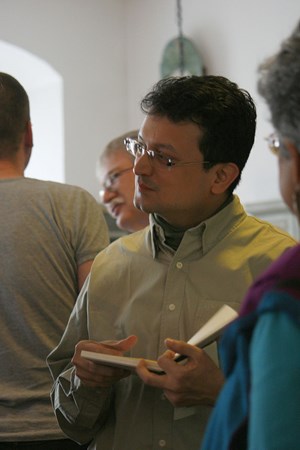
The writer, cultural theorist, art critic, and curator Ranjit Hoskoté resigned from the original six-member committee entrusted with selecting the Artistic Direction of the 16th edition of documenta (2027).
Ranjit Hoskoté had come under fire in recent days for having signed the Statement against consulate general of Israel, Mumbai's event on Hindutva and Zionism (dated August 26, 2019) and its BDS connections and anti-Semitic content.
Ranjit Hoskoté subsequently made it clear to documenta und Museum Fridericianum gGmbH in intensive discussions that he rejects the aims of BDS and does not support the movement. Furthermore, documenta und Museum Fridericianum gGmbH had asked him to comment on the content of the statement, which the gGmbH considered to be clearly anti-Semitic, and his position on this, with the expectation that he would distance himself unequivocally from his signature and the anti-Semitic content of the statement. This was followed by Ranjit Hoskoté's letter in which he declared his resignation.
Andreas Hoffmann, Managing Director of documenta und Museum Fridericianum gGmbH, emphasizes: "I would like to thank Ranjit Hoskoté for his willingness to stand by us in these difficult times and believe that his decision to resign is a logical and respectable one. The current developments surrounding the documenta 16 Finding Committee show once again how long the road to a consistent reappraisal of documenta 15 still is. We need to consistently distance ourselves from all forms of anti-Semitism. The events of summer 2022 must not be repeated. This is the only way to achieve a genuine new beginning after the events of documenta fifteen."
What this development means for the further process with regard to the scheduling and composition of the Finding Committee is currently the subject of intense discussions between the shareholders, the Supervisory Board, the non-profit GmbH, and those involved in the Finding Committee.
Ranjit Hoskoté's Letter of Resignation (Sunday, November 12, 2023)
"Dear Andreas,
These last few days have been among the most deeply distressing days of my life. The monstrous charge of anti-Semitism has been brought against my name in Germany, a country I have regarded with love and admiration, and to whose cultural institutions and intellectual life I have contributed for several decades, as a writer, curator and cultural theorist. Members of the German commentariat who have no acquaintance with my life and work have judged, denounced and stigmatised me on the basis of a single signature on a petition, taken out of its context and not approached in the spirit of reason. I have been written about with harshness and condescension, and none of my detractors has thought it important to ask me for my point of view. I feel, strongly, that I have been subjected to the proceedings of a kangaroo court.
It is clear to me that there is no room, in this toxic atmosphere, for a nuanced discussion of the issues at stake. And now – in what strikes me as a doomed attempt to save a situation that is beyond saving – I am being asked to accept a sweeping and untenable definition of anti-Semitism that conflates the Jewish people with the Israeli state; and that, correspondingly, misrepresents any expression of sympathy with the Palestinian people as support for Hamas.
My conscience does not permit me to accept this sweeping definition and these strictures on human empathy. Such a definition and such strictures have been opposed by prominent Jewish thinkers such as the philosopher Omri Boehm, the historian Moshe Zimmermann, the columnist Gideon Levy, the philosopher Michael Marder and many, many others, who reject the equation of anti-Zionism with anti-Semitism. A system that insists on such a definition and such strictures – and which chooses to ignore both criticality and compassion – is a system that has lost its moral compass. I say this with the greatest sadness.
It pains me to say that such circumstances negate Documenta’s historic openness to a diversity of positions and its capacity for sustaining the life of the imagination in a supportive environment. I greatly fear that these circumstances will compromise the generosity of spirit and the willingness to engage in dialogue, which have long been sterling features of Germany’s contribution to global cultural politics.
As such, I find myself unable to perform my duties towards Documenta, an institution for which I have had great affection and which I have known well for more than twenty years, ever since Okwui Enwezor invited me to chair a panel at the Delhi platform of Documenta 11 in May 2001. It has been an honour to serve on the Finding Committee for Documenta 16, and it has been a pleasure to get to know you and work with you. With much regret, I must offer you my resignation and step down from the Finding Committee.
As I leave, you will agree that it is only fair that I should be permitted to state my side of this case, for the record. I would like to do this, as follows:
1. I wish to re-state that I have the highest regard for the Jewish people, and have always had the deepest empathy with their historic sufferings and admiration for their glorious cultural achievements. This is evident in my essays, my lectures, and my books. I am appalled by the accusation that I am anti-Semitic, and the suggestion that I am in need of instruction on this sensitive subject. Simple biographical factors render this accusation absurd. I was brought up in a pluralist family, which took pride in the diversity of India, including the presence, among us, of three distinct Jewish communities – the Bene Israel, the Cochini Jews, and the Baghdadi Jews – for centuries. My first mentor and dear friend, the great Indian poet and art critic Nissim Ezekiel, was a member of the Bene Israel community. Indeed, one of my great-aunts, Kitty Shiva Rao, was born Kitty Verständig in a Viennese Jewish family; she made her home in a newly independent India, applying her knowledge of the Holocaust to healing a young country that had been born amidst the horrors of the Partition. The Shoah is not external to me; it is one of the strands in my own family history.
2. Putting aside biographical factors, I wish to place on record, also, that I have publicly opposed the intellectual and cultural boycott of Israel – on the grounds that this will further weaken and isolate our liberal, progressive, critical and inclusive colleagues within Israel. I do not share the BDS position, and disagree with it. My heart goes out both to the Jewish people and the Palestinian people, who have suffered an unremitting condition of strife for more than seven decades in West Asia.
I condemn unequivocally the terror unleashed by Hamas against Israel on 7 October 2023, and the horrendous massacre by Hamas militants of Israeli men, women and children as well as Palestinian, Thai, Filipino, Nepali and other individuals. I mourn the deaths of these innocent people. At the same time, I cannot ignore the brutal programme of annihilation that the government of Israel has launched against the Palestinian civilian population, in retaliation. I cannot look away from this humanitarian catastrophe, its cost exacted in the lives of innocent men, women and children. Now, more than ever, there is a compelling need to bring the communities of Israel and Palestine together; to renounce the exceptionalism of suffering on both sides, and to craft a solidarity of grief, a communion of shared vulnerability, and a process of healing and renewal.
3. Let us now consider the so-called evidence that has been presented against me: my signature on a petition circulated by the Indian Cultural Forum and dated 26 August 2019, protesting a discussion hosted by the Consulate General of Israel in Mumbai, on ‘Leaders’ Idea of Nations: Zionism and Hindutva’. The invitation for this event presented a portrait of Theodor Herzl, the founding figure of Zionism, alongside a portrait of V D Savarkar, a founding figure of Hindutva.
My reason for signing this petition was because the event clearly posited an equivalence between Herzl and Savarkar, and was intended to develop intellectual respectability for an alliance between Zionism and Hindutva. I found this highly ironic, since Savarkar was known to be an admirer of Hitler and openly expressed his admiration for the Nazi ideology and methods, which he proposed as a model for a Hindu-majoritarian India to follow, especially with regard to the treatment of the religious minorities. No member of the German commentariat who denounced me has asked herself or himself why the Israeli Consulate General thought it appropriate to equate Zionism with Hindutva, in the first place.
I have dedicated my life to opposing authoritarian forces and discriminatory ideologies, and my signature carried with it the weight of my commitment to dialogue, inclusiveness, mutuality, and the ceaseless quest for common ground. This commitment remains with me, as the cornerstone of my life.
With warm good wishes, Ranjit"

ArtDependence Magazine is an international magazine covering all spheres of contemporary art, as well as modern and classical art.
ArtDependence features the latest art news, highlighting interviews with today’s most influential artists, galleries, curators, collectors, fair directors and individuals at the axis of the arts.
The magazine also covers series of articles and reviews on critical art events, new publications and other foremost happenings in the art world.
If you would like to submit events or editorial content to ArtDependence Magazine, please feel free to reach the magazine via the contact page.